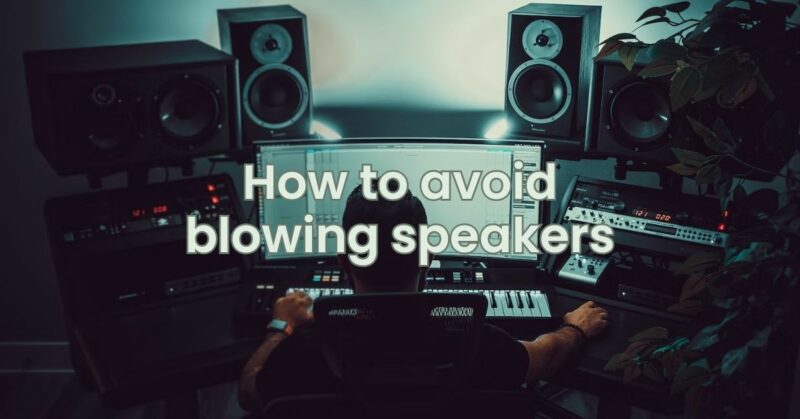The heart-thumping bass, the soaring highs, the immersive vocals – your speakers are the gateway to your audio universe. However, this gateway can become a double-edged sword if not handled carefully. Blowing speakers is a dreaded scenario that can disrupt your audio experience and your budget. But fear not, for in this article, we’ll guide you through the steps to protect your speakers from premature demise. By understanding the dynamics of speaker operation, recognizing danger signs, and practicing responsible audio habits, you’ll be equipped to enjoy your sound system without the fear of blowing your precious speakers.
Understanding Speaker Power Handling
Speakers are designed to handle specific amounts of power, often measured in watts (W). This power handling capacity varies from speaker to speaker and is usually specified by manufacturers. Exceeding this power limit can lead to permanent damage, distortion, and, in worst cases, speaker failure.
Practical Tips to Avoid Blowing Speakers
- Match Amplifier Power: Ensure that the power output of your amplifier or receiver matches or is lower than the power handling capacity of your speakers. This prevents overloading the speakers with excessive power.
- Use a Volume Limiter: If you’re concerned about accidental overdriving, consider using a volume limiter or an audio management system that prevents your system from reaching dangerous levels.
- Avoid Distortion: Distorted audio signals, often caused by clipping or low-quality amplifiers, can lead to speaker damage. Ensure your amplifier is of good quality and isn’t driven into distortion.
- Avoid Sudden Surges: Sudden spikes in volume, whether from accidental knob turns or source changes, can stress your speakers. Gradually increase the volume to avoid shocks to the system.
- Use a Subwoofer: Incorporating a subwoofer can help in bass-heavy scenarios, as it takes some load off the main speakers, reducing the risk of overloading.
- Bass Management: Adjust bass levels and frequencies to ensure that your speakers aren’t trying to reproduce frequencies that are beyond their capabilities.
- Monitoring Distortion: Listen for distortion, clipping, or any unusual sounds. If you hear these, lower the volume immediately to prevent damage.
- Quality Source Material: Poorly recorded or overly compressed audio tracks can stress speakers. Opt for high-quality source material for better audio reproduction.
- Proper Placement: Position your speakers correctly, giving them adequate ventilation and avoiding placing them near walls that can reflect sound waves back into the speakers.
- Regular Maintenance: Inspect speakers for visible damage, loose components, or signs of wear. Address any issues promptly.
Conclusion
Blowing speakers isn’t just a matter of loud music; it’s about understanding the balance between power, distortion, and responsible audio practices. By respecting your speakers’ power handling capacities, using suitable amplifiers, avoiding distortion, and practicing mindful volume control, you can enjoy your audio system to the fullest without risking the health of your precious speakers. Remember, prevention is the key – treat your speakers with care, and they’ll faithfully deliver the audio magic you crave for years to come.


